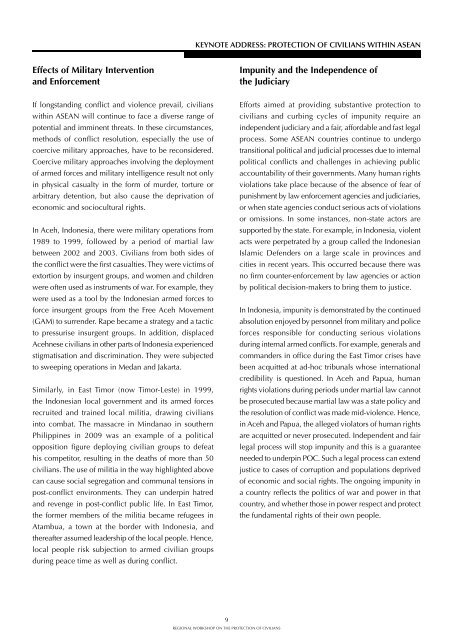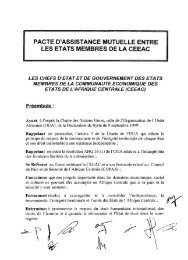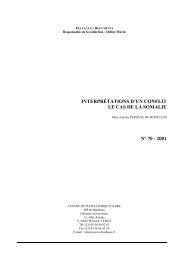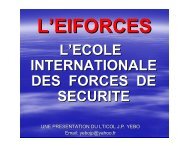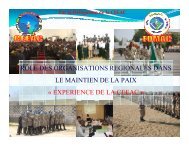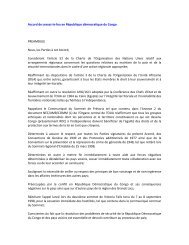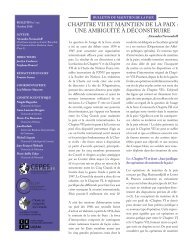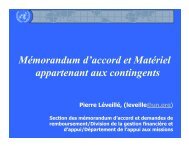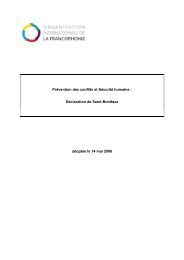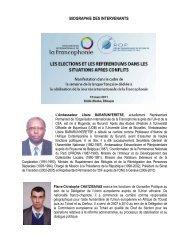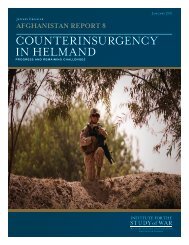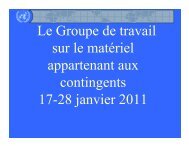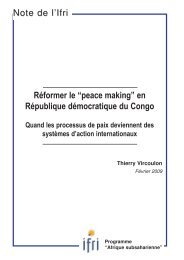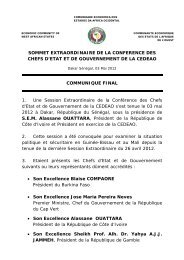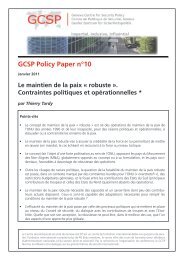Regional Workshop on the Protection of Civilians - S. Rajaratnam ...
Regional Workshop on the Protection of Civilians - S. Rajaratnam ...
Regional Workshop on the Protection of Civilians - S. Rajaratnam ...
You also want an ePaper? Increase the reach of your titles
YUMPU automatically turns print PDFs into web optimized ePapers that Google loves.
KEYNOTE ADDRESS: PROTECTION OF CIVILIANS WITHIN ASEAN<br />
Effects <strong>of</strong> Military Interventi<strong>on</strong><br />
and Enforcement<br />
Impunity and <strong>the</strong> Independence <strong>of</strong><br />
<strong>the</strong> Judiciary<br />
If l<strong>on</strong>gstanding c<strong>on</strong>flict and violence prevail, civilians<br />
within ASEAN will c<strong>on</strong>tinue to face a diverse range <strong>of</strong><br />
potential and imminent threats. In <strong>the</strong>se circumstances,<br />
methods <strong>of</strong> c<strong>on</strong>flict resoluti<strong>on</strong>, especially <strong>the</strong> use <strong>of</strong><br />
coercive military approaches, have to be rec<strong>on</strong>sidered.<br />
Coercive military approaches involving <strong>the</strong> deployment<br />
<strong>of</strong> armed forces and military intelligence result not <strong>on</strong>ly<br />
in physical casualty in <strong>the</strong> form <strong>of</strong> murder, torture or<br />
arbitrary detenti<strong>on</strong>, but also cause <strong>the</strong> deprivati<strong>on</strong> <strong>of</strong><br />
ec<strong>on</strong>omic and sociocultural rights.<br />
In Aceh, Ind<strong>on</strong>esia, <strong>the</strong>re were military operati<strong>on</strong>s from<br />
1989 to 1999, followed by a period <strong>of</strong> martial law<br />
between 2002 and 2003. <strong>Civilians</strong> from both sides <strong>of</strong><br />
<strong>the</strong> c<strong>on</strong>flict were <strong>the</strong> first casualties. They were victims <strong>of</strong><br />
extorti<strong>on</strong> by insurgent groups, and women and children<br />
were <strong>of</strong>ten used as instruments <strong>of</strong> war. For example, <strong>the</strong>y<br />
were used as a tool by <strong>the</strong> Ind<strong>on</strong>esian armed forces to<br />
force insurgent groups from <strong>the</strong> Free Aceh Movement<br />
(GAM) to surrender. Rape became a strategy and a tactic<br />
to pressurise insurgent groups. In additi<strong>on</strong>, displaced<br />
Acehnese civilians in o<strong>the</strong>r parts <strong>of</strong> Ind<strong>on</strong>esia experienced<br />
stigmatisati<strong>on</strong> and discriminati<strong>on</strong>. They were subjected<br />
to sweeping operati<strong>on</strong>s in Medan and Jakarta.<br />
Similarly, in East Timor (now Timor-Leste) in 1999,<br />
<strong>the</strong> Ind<strong>on</strong>esian local government and its armed forces<br />
recruited and trained local militia, drawing civilians<br />
into combat. The massacre in Mindanao in sou<strong>the</strong>rn<br />
Philippines in 2009 was an example <strong>of</strong> a political<br />
oppositi<strong>on</strong> figure deploying civilian groups to defeat<br />
his competitor, resulting in <strong>the</strong> deaths <strong>of</strong> more than 50<br />
civilians. The use <strong>of</strong> militia in <strong>the</strong> way highlighted above<br />
can cause social segregati<strong>on</strong> and communal tensi<strong>on</strong>s in<br />
post-c<strong>on</strong>flict envir<strong>on</strong>ments. They can underpin hatred<br />
and revenge in post-c<strong>on</strong>flict public life. In East Timor,<br />
<strong>the</strong> former members <strong>of</strong> <strong>the</strong> militia became refugees in<br />
Atambua, a town at <strong>the</strong> border with Ind<strong>on</strong>esia, and<br />
<strong>the</strong>reafter assumed leadership <strong>of</strong> <strong>the</strong> local people. Hence,<br />
local people risk subjecti<strong>on</strong> to armed civilian groups<br />
during peace time as well as during c<strong>on</strong>flict.<br />
Efforts aimed at providing substantive protecti<strong>on</strong> to<br />
civilians and curbing cycles <strong>of</strong> impunity require an<br />
independent judiciary and a fair, affordable and fast legal<br />
process. Some ASEAN countries c<strong>on</strong>tinue to undergo<br />
transiti<strong>on</strong>al political and judicial processes due to internal<br />
political c<strong>on</strong>flicts and challenges in achieving public<br />
accountability <strong>of</strong> <strong>the</strong>ir governments. Many human rights<br />
violati<strong>on</strong>s take place because <strong>of</strong> <strong>the</strong> absence <strong>of</strong> fear <strong>of</strong><br />
punishment by law enforcement agencies and judiciaries,<br />
or when state agencies c<strong>on</strong>duct serious acts <strong>of</strong> violati<strong>on</strong>s<br />
or omissi<strong>on</strong>s. In some instances, n<strong>on</strong>-state actors are<br />
supported by <strong>the</strong> state. For example, in Ind<strong>on</strong>esia, violent<br />
acts were perpetrated by a group called <strong>the</strong> Ind<strong>on</strong>esian<br />
Islamic Defenders <strong>on</strong> a large scale in provinces and<br />
cities in recent years. This occurred because <strong>the</strong>re was<br />
no firm counter-enforcement by law agencies or acti<strong>on</strong><br />
by political decisi<strong>on</strong>-makers to bring <strong>the</strong>m to justice.<br />
In Ind<strong>on</strong>esia, impunity is dem<strong>on</strong>strated by <strong>the</strong> c<strong>on</strong>tinued<br />
absoluti<strong>on</strong> enjoyed by pers<strong>on</strong>nel from military and police<br />
forces resp<strong>on</strong>sible for c<strong>on</strong>ducting serious violati<strong>on</strong>s<br />
during internal armed c<strong>on</strong>flicts. For example, generals and<br />
commanders in <strong>of</strong>fice during <strong>the</strong> East Timor crises have<br />
been acquitted at ad-hoc tribunals whose internati<strong>on</strong>al<br />
credibility is questi<strong>on</strong>ed. In Aceh and Papua, human<br />
rights violati<strong>on</strong>s during periods under martial law cannot<br />
be prosecuted because martial law was a state policy and<br />
<strong>the</strong> resoluti<strong>on</strong> <strong>of</strong> c<strong>on</strong>flict was made mid-violence. Hence,<br />
in Aceh and Papua, <strong>the</strong> alleged violators <strong>of</strong> human rights<br />
are acquitted or never prosecuted. Independent and fair<br />
legal process will stop impunity and this is a guarantee<br />
needed to underpin POC. Such a legal process can extend<br />
justice to cases <strong>of</strong> corrupti<strong>on</strong> and populati<strong>on</strong>s deprived<br />
<strong>of</strong> ec<strong>on</strong>omic and social rights. The <strong>on</strong>going impunity in<br />
a country reflects <strong>the</strong> politics <strong>of</strong> war and power in that<br />
country, and whe<strong>the</strong>r those in power respect and protect<br />
<strong>the</strong> fundamental rights <strong>of</strong> <strong>the</strong>ir own people.<br />
9<br />
REGIONAL WORKSHOP ON THE PROTECTION OF CIVILIANS


